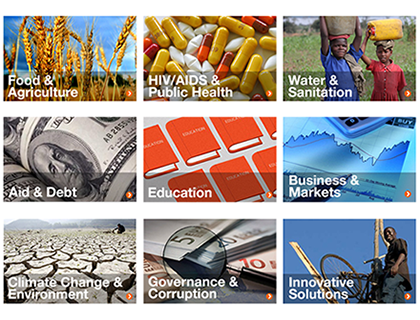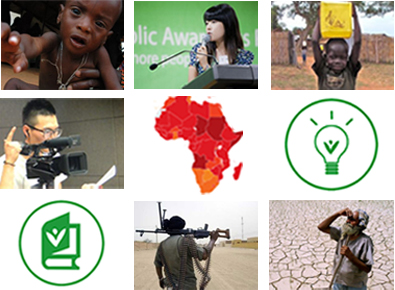
 |
|
 |
 |
 |
 |
 |
 |
 |
| Our Story | ||||
| "Every morning our newspapers could read, 'More than 20,000 people perished yesterday of extreme poverty.' How? The poor die in hospital wards that lack drugs, in villages that lack antimalarial bed nets, in houses that lack safe drinking water. They die namelessly, without public comment. Sadly, sad stories rarely get written."
- Jeffrey Sachs, Economist at Colombia University |
||||
| South Korea is the first former aid recipient that became a member of the Development Assistance Committee (DAC) of the Organization for Economic Cooperation and Development (OECD). After the Korean War in the early 1950s, South Korea had relied heavily on emergency relief. Effectively using the enormous amount of aid and was indispensable to Korea’s reconstruction. Therefore, South Korea needs to realize its responsibility to join the international society in alleviating poverty. |
 |
However, most mass media in South Korea do not provide sufficient coverage on the issues affecting global poverty. To address this problem, we constructively coordinate online volunteers’ to provide and share open knowledge to a broader range of public. More access to open knowledge about issues affecting global health and global poverty via social media enhances social awareness. Sharing open knowledge of global poverty and public health is the ultimate way to garner public attention, and a better understanding of global poverty lead the public to join humanitarian engagements, global policy discussions for more creative solutions. Therefore, open knowledge in Korean available online is an incredible tool to help more people understand what is going on in nations suffering from extreme poverty, as it arouses altruistic emotions for humanitarian actions. | ||
| We have an overarching focus on the intersection between social awareness, culture of engagement and open public knowledge. Through online social media, people can easily find, copy, modify, remix, and share information. We provide information on issues affecting global poverty, including food crisis, public health, diseases, HIV/AIDS, climate change, water shortage, sanitation, governance, corruption, heavy debt, and education in Sub-Saharan Africa and South-East Asia. We also put emphasis on sustainable development and innovative solutions. GP3 Korea’s knowledge production and sharing are sustained entirely by volunteers who work in collaborations. Software engineers, writers, media producers, creative artists, web designers, bloggers, innovators, economists, and pro bono lawyers around the country and abroad work together via online communications to raise public awareness on global poverty. This production model for public knowledge on world poverty is a new approach to fight against extreme poverty. |
||
| With a widely and openly shared knowledge on global poverty, society can promote participatory culture in philanthropy, increase the amount of developmental assistance, and inspire policy discussions for creative solutions. We effectively distribute information through Facebook, Twitter, mobile application, Kakao Talk(a Korean free texting app) and other various online social network services. We also built a wiki-based open knowledge library, the Global Poverty Digital Library (www.povertywiki.org), which contains numerous articles, latest news release, columns, and book reviews on poverty-related issues. This online archive is open to anyone who wishes to access to the information whenever and wherever. |  |
||
|
GP3 Korea 2013. Creative Commons Attribution-Non Commercial-ShareAlike 2.0 License The Global Poverty Public Awareness Project in Korea. Designed by Jeong-ae Lee, Ranhee Kim, Suk-hwan Lim, Jaewoo Choi, Ji-won Oh & Seung-won Baek |